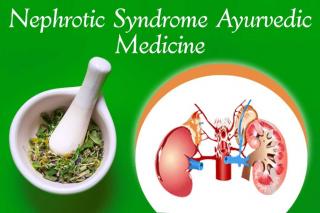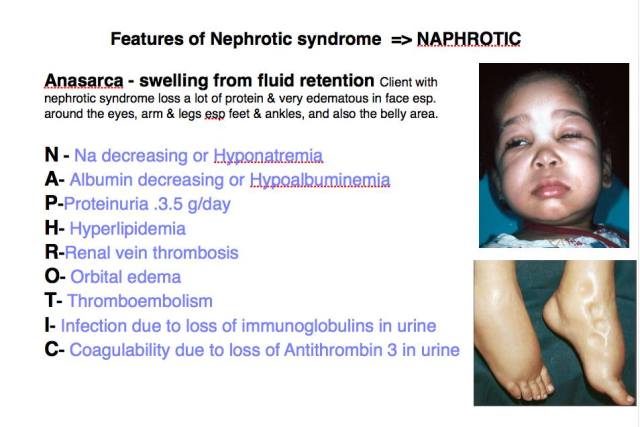108 Glen Osmond Road, Parkside

Nephrotic syndrome isn’t a disease; it’s a group of symptoms that can appear if your kidneys aren’t working properly.
One of the main jobs of your kidneys is to filter your blood. This allows you to pass your body's waste products, extra fluid, and salts through your urine. The glomeruli are the parts of the kidney where this happens.
With healthy kidneys, proteins in your blood don't usually leak into the urine during the filtering process. But if the glomeruli become damaged, proteins such as albumin can leak into your urine along with the waste products. If too much protein leaks out, that is known as nephrotic syndrome.

Causes:-
You might have a condition that affects only your kidneys - the “primary” cause of nephrotic syndrome, or you might have an issue with another part of your body that also affects your kidneys - the “secondary” cause of nephrotic syndrome.
Some of the conditions that can damage your glomeruli include:
* Minimal change disease, which is the main cause of nephrotic syndrome in children. Doctors don’t know why this disease stops the kidneys from working properly. Kidney tissue from people with this disease looks relatively normal under a microscope.
* Focal segmental glomerulosclerosis, or FSGS, is a disease that scars the glomeruli. It’s the most common primary cause of nephrotic syndrome in adults.
* Membranous nephropathy, in which the membranes of the glomeruli thicken. Researchers don’t know why this happens, exactly, but it’s been linked to cancer, malaria, hepatitis B, and lupus.
* Diabetes, is the most common secondary cause of nephrotic syndrome in adults. It can cause kidney damage, known as diabetic nephropathy.
* Lupus (systemic lupus erythematosus), a chronic disease of the immune system, can seriously damage the kidneys.
* Amyloidosis, which happens when you have a buildup of substances called amyloid proteins in your blood. This can damage your kidneys.

Symptoms:-

The symptoms of this disorder vary from person to person, but the most common symptoms include :
* Edema: Bloating or swelling of the body due to the accumulation of water in excessive amounts. It is experienced by 95% of the patients suffering from this disorder. The swelling may be noticed in the face, feet, hands, abdomen, etc.
* Hematuria: A condition wherein the patient may lose blood while passing urine.
* Oliguria: The quantity of urine the person passes decreases substantially when he is suffering from this syndrome.
* Pleural effusion: The person experiences difficulty in breathing due to the accumulation of water in the space surrounding the lungs.
* High blood pressure: An individual suffering from this disorder experiences high blood pressure regardless of their age.
* Besides these symptoms, the patient appears pale and experiences anorexia, loss of appetite, and fatigue.
Ayurvedic view and treatment options:-
According to Ayurveda, Nephrotic Syndrome is caused by the blockage of minute body channels called Srotas in the kidneys. The body channels known as Mutravaha srotas carry urine and are responsible for the flow of liquid into and out of the kidneys. If there are blockages in the incoming Srotas, the kidneys are denied fluids shrinkage occurs, and if the outgoing channels are blocked, swelling occurs.
According to Ayurveda, there are three Doshas in the body – Vata, Pitta, and Kapha. The disease is caused by the vitiation of these doshas. Nephrotic Syndrome is caused due to the vitiation of Pitta dosha. Treatment includes medication for normalizing Pitta dosha.
Ayurvedic Treatment for Nephrotic Syndrome:-
According to modern medicine, there has been no definite cure for this disease. The most important part is the best management of the various symptoms and complications. All the medicines are given to take care of the vital functions. In the case of the children, sometimes the disease subsides by itself as age increases. Some immunosuppressant drugs in modern medical science can control this disease, but they are also associated with many side effects.
Ayurveda has some specific herbs that directly or indirectly help the kidney cells to improve their function, to stop the autoimmune and anti-inflammatory pathology, and to regenerate new normal cells. Some of these are as follows:
* Punarnava ( Boerhavia diffusa ) - Punarnava has a special action on the heart; it increases the strength of the heartbeat, thus increasing the output of blood from the heart. It also increases the circulation of blood to the kidney, thus reviving the kidney from many diseases like renal failure, nephrotic syndrome, glomerulonephritis, and others. It acts best in edema, ascites, as well as in renal failure. The combination of the anti-inflammatory action of punarnava makes it best for renal inflammatory disease. It is a safe drug for nephrotic syndrome.
* Gokshuru ( Tribulus Terrestris) - it is the best-known genitor urinary tonic, giving strength to the kidneys, urinary bladder, and ureter, as well as giving strength to the penis by increasing the blood circulation. Gokhru directly affects the renal tissue to rejuvenate the damaged tissues of the kidney in renal failure. It has an established diuretic effect and is also used in crushing the renal stones.
* Rakta chandana ( P. Santalinus )- it is diuretic and anti-infective. It acts like a cooling agent in the urinary tract. It acts as a urinary alkalizer as well.

* Palaash ( Butea monosperma) - it acts as a urinary alkalizer. It can fight infections of the urinary system.

* Kasani (Cichorium intybus ) - This is a very common herb and is commonly known as chicory. It is a very good alkalizer and also gives strength to the kidneys.

* Trin-panchmool - this is a combination of the roots of the five herbs, which have been used in kidney disorders for ages. These are very good in improving the renal functions at all levels. They help the kidneys to regenerate the newer, healthier cells so that protein loss can be minimized.
* Guggul - Guggul, when combined with other specific herbs, acts as a disease-modifying agent for the diseased kidneys and improves the functions of the kidney over time.
Ayurvedic management of Nephrotic Syndrome involves analysis of your body prakriti & prescribing herbs accordingly. For expert advice, please CONTACT Life Line Ayurvedic Herbal Clinic.
Disclaimer : Sandeep Kumar and Anupam Vasudeva are not GP, they have Ayurveda medical degree from India where it is considered equal to any other medical degree. This qualification is recognized in Australia by vetassess governing body as Complementary Health Therapists. Life Line Ayurvedic Herbal Clinic does not claim to cure a disease or terminal illness and does not create any unreasonable expectation of beneficial treatment. Ayurvedic medicines and treatments are generally considered to be safe but rarely may be associated with possible adverse reactions in individual cases. We recommend seeking urgent medical attention in the case of an adverse reaction. This website provides you with information. You must contact your Ayurvedic or another health professional before you apply them. Read More